 Petzlover
PetzloverBicolor is originated from United States but Red Point Siamese is originated from United Kingdom. Both Bicolor and Red Point Siamese are having almost same weight. Both Bicolor and Red Point Siamese has almost same life span. Both Bicolor and Red Point Siamese has same litter size. Bicolor requires Moderate Maintenance. But Red Point Siamese requires Low Maintenance
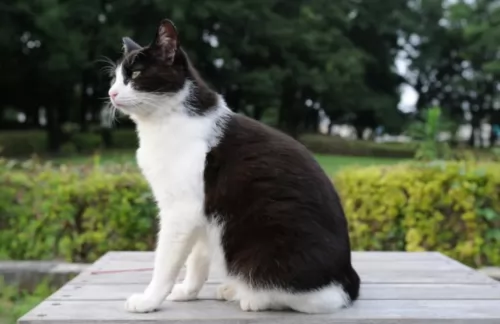 The first thing to know is that a Bicolor cat isn’t in fact a breed. Bicolor is just a term that describes a certain look that a cat has with its coat. It’s a cat with two colors such as red and white or black and white.
The first thing to know is that a Bicolor cat isn’t in fact a breed. Bicolor is just a term that describes a certain look that a cat has with its coat. It’s a cat with two colors such as red and white or black and white.
A popular name for bi-color cats is also Piebald or Tuxedo, and in fact many cat breeds can produce bicolor kittens, or black and white kittens such as Cornish Rex, Maine Coon, Manx, and others.
There are different coat color combinations when it comes to bicolor cats and the black and white markings may be more common but there are other color combinations too such as orange and white.
Nobody seems to know the origins of the Bicolor cats so we are going to assume they come from the USA.
The Siamese cat remains one of the most famous among the cat breeds. The Red Point is also known as the Flame Point Siamese cat. This breed of Siamese is rare.
It is believed that when the seal point Siamese breed was first introduced to the U.K in the 1930s they were bred with cats that carried these orange genes such as the tabby or tortoiseshell British shorthair cats.
Breeders wanted to produce a Siamese-style pointed cat in colors other than the traditional shades,
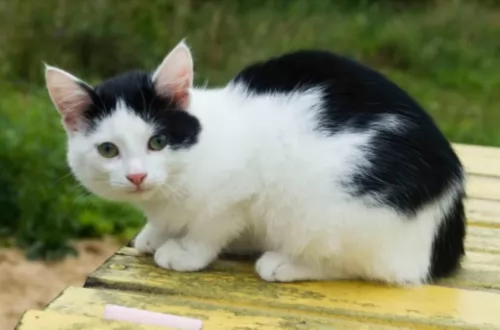 Regardless of the breed they belong to, information on these cats suggests that they can have many different looks. Look at the amazing Turkish Van cat for instance – each of these cats is recognizable for its long, luxurious fur. You’ll find a few touches of color on the cat's ears and tail, making in a Bicolor. They also have an interesting characteristic – being fond of water!
Regardless of the breed they belong to, information on these cats suggests that they can have many different looks. Look at the amazing Turkish Van cat for instance – each of these cats is recognizable for its long, luxurious fur. You’ll find a few touches of color on the cat's ears and tail, making in a Bicolor. They also have an interesting characteristic – being fond of water!
These Bicolor cats weigh in the region of 3 – 7kg, and can tend towards the smaller or larger size. Some of them can have short or long hair, larger or smaller ears and green or yellow eyes.
Coming from different cat breeds, the bicolor cat can have a mix of wonderful characteristics – they can be vocal or quiet or confident or shy.
They’re always wonderful though and can be curious, intelligent, playful, loving and loyal. They make great companions who just love the interaction they have with their human owners.
These cats are medium-sized, muscular cats and can weigh between 3 and 6kg. The neck is fairly long, the legs long and lean too.
These attractive cats have got reddish-gold points and with their sparkling blue almond-shaped eyes they really are a beautiful breed of cat. Like other Siamese kittens, the Redpoint kittens are also white when they are born. Variations of the Red Point Siamese cat should always have creamy-white bodies with the reddish-orange points.
The coat is short, thick, and silky. The points start emerging later on and deepen as the cat matures. You may see reddish freckling over the face, legs and paws as well as the tail.
The Redpoint Siamese is playful, social, friendly and intelligent. They love nothing more than to be around their human family but don’t warm too well to strangers.
They tend to become possessive over what they feel is theirs. They are also very vocal and have a different meow to express their feelings. These are definitely cats that don’t like being left alone for long periods of time. They want to be occupied and entertained and will need lots of stimulating toys to keep them occupied and exercised.
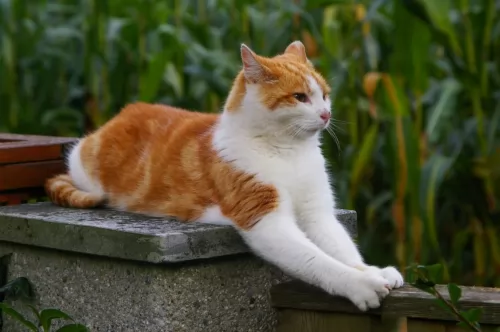 The Bicolor cat is such a steady, reliable cat-friend to have. When you start looking as these cats as your companion, you're going to get a smart, funny, adoring, playful family member who will be there for you whether you go to work each day or stay at home.
The Bicolor cat is such a steady, reliable cat-friend to have. When you start looking as these cats as your companion, you're going to get a smart, funny, adoring, playful family member who will be there for you whether you go to work each day or stay at home.
They’re such easygoing cats, with no airs and graces. They’re happy, relaxed, and uncomplicated cats and when you make a Bicolor your pet and friend, your life just becomes that much more meaningful.
If you’re looking for an exceptionally affectionate cat, then the Red Point Siamese is full of personality and will suit you very well as these cats are remarkably affectionate.
They always take an interest in what their humans are getting up to. They’re capable of forming strong bonds with their human family. They are also curious and intelligent and they can be taught a few tricks too.
They’re good-natured with their own human family but are not friendly with strangers.
They’re also energetic and agile and love to leap up onto a perch or your shoulders and survey his world from there.
If you want a cat that is an involved member of your family and an awesome companion, the Red Point Siamese will fit into this category superbly well.
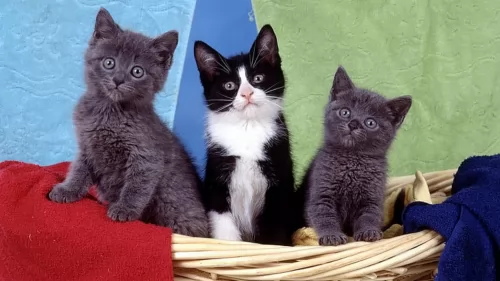 By providing your kitty cat with a loving home, you can ensure that he stays as healthy as possible. Unfortunately though, cats can get sick, regardless of how well you take care of them and then as a responsible pet owner, you will be able to take your pet to your local vet.
By providing your kitty cat with a loving home, you can ensure that he stays as healthy as possible. Unfortunately though, cats can get sick, regardless of how well you take care of them and then as a responsible pet owner, you will be able to take your pet to your local vet.
Some of the common cat problems you get can be kidney disease, ear infections, dental disease, parasites such as heartworm, cancer or something like feline immunodeficiency virus.
Whether your cat has a virus or an infection, remember that getting your cat to the vet can mean nipping the problem in the bud before it gets more serious.
The Red Point Siamese isn’t going to have any more cat diseases than any other cat. Any cat stands a better chance at good health when they have an exceptionally healthy diet.
Have your cats neutered or spayed to prevent unwanted kittens and to promote better health for your cats.
Watch out for diseases such as Progressive retinal atrophy (PRA), a genetic eye problem where the cells deteriorate. The disease, though not painful, can lead to blindness.
Obesity in cats, but particularly a slim, athletic cat such as the Red Point Siamese, can bring on a host of health issues. Overfeeding your cat isn’t a form of love but an irresponsible act. There are just too many dangers linked to being overweight to ignore. Excess weight can lead to joint problems as well as diabetes, and just getting rid of a little bit of weight can already result in increased overall good health.
Cat experts tell us that excess weight can shorten your pet’s life by 2 years. Get some tips on feeding your cat and keep him playfully active as well.
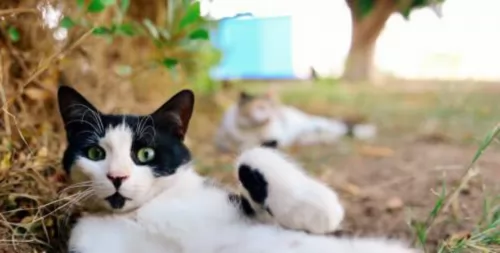 Caring for your Bicolor cat is much the same as with any other cat. Your Bicolor will shed, so brushing him will tickle him pink, especially if you do it lovingly and gently – it’s like a bonding session. The weekly brushing will get rid of loose hairs and dust and keep the coat healthy and shiny.
Caring for your Bicolor cat is much the same as with any other cat. Your Bicolor will shed, so brushing him will tickle him pink, especially if you do it lovingly and gently – it’s like a bonding session. The weekly brushing will get rid of loose hairs and dust and keep the coat healthy and shiny.
Spay or neuter your pet to avoid unwanted kittens. Stay up to date on veterinary visits and vaccinations.
Provide your cat with stimulating toys as well as all the equipment he needs to be comfortable – food and water bowls, litter box, grooming equipment, bedding, climbing- and scratching equipment.
All cat owners, whether their cats eat homemade food or wet- or dry food should read cat food labels and understand the nutrients content.
Certainly, as a carnivore, cats require certain vitamins, minerals, and proteins that only meat can provide.
Understand how to work out if the cat food is balanced or not and not packed with too many grains and carbohydrates.
How much your Bicolor eats will depend on his age and his activity levels. Be careful not to overfeed your cat as overfeeding is dangerous. When cats put on too much weight, it leads to problems such as diabetes, heart- and joint disease.
With good care these cats cat reach 15 – 20 years of age.
The Red Point Siamese cat does shed but because it’s a low shedding cat, it becomes low maintenance. They usually shed in spring and again in the autumn. The short, easy-to-care-for coat can be brushed once a week.
Cats are strict carnivores, and just as a wild cat feeds on animal protein, so it is with a domesticated cat. They require a host of nutrients and only the best, high-quality foods contain these nutrients.
You get dry, semi-moist, and canned cat foods and the best commercial cat food manufacturers ensure that these foods have all the right balances of nutrients a cat needs.